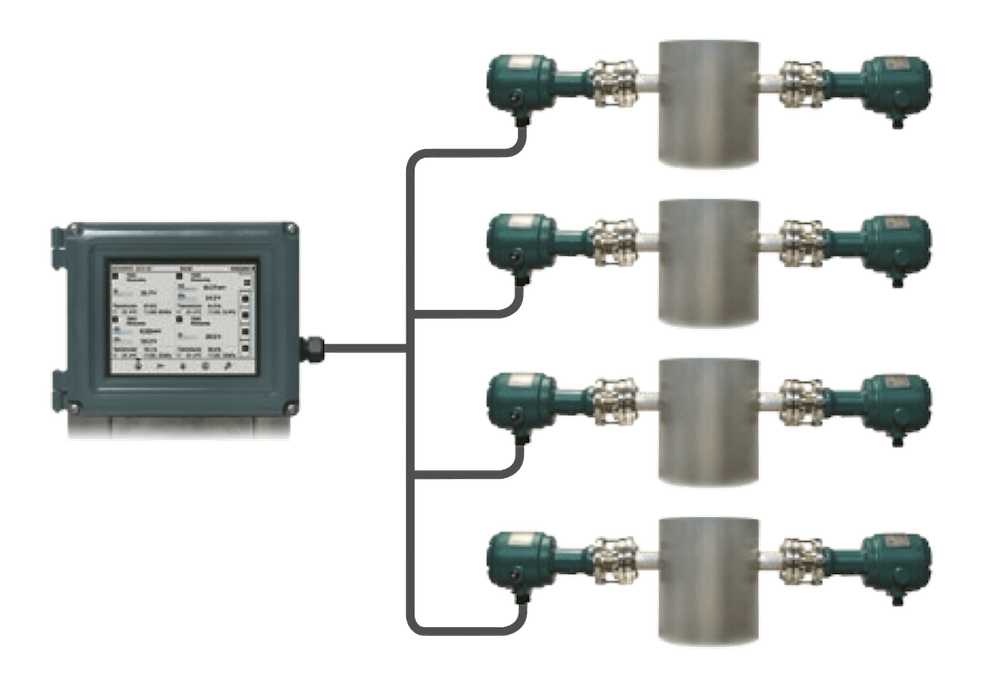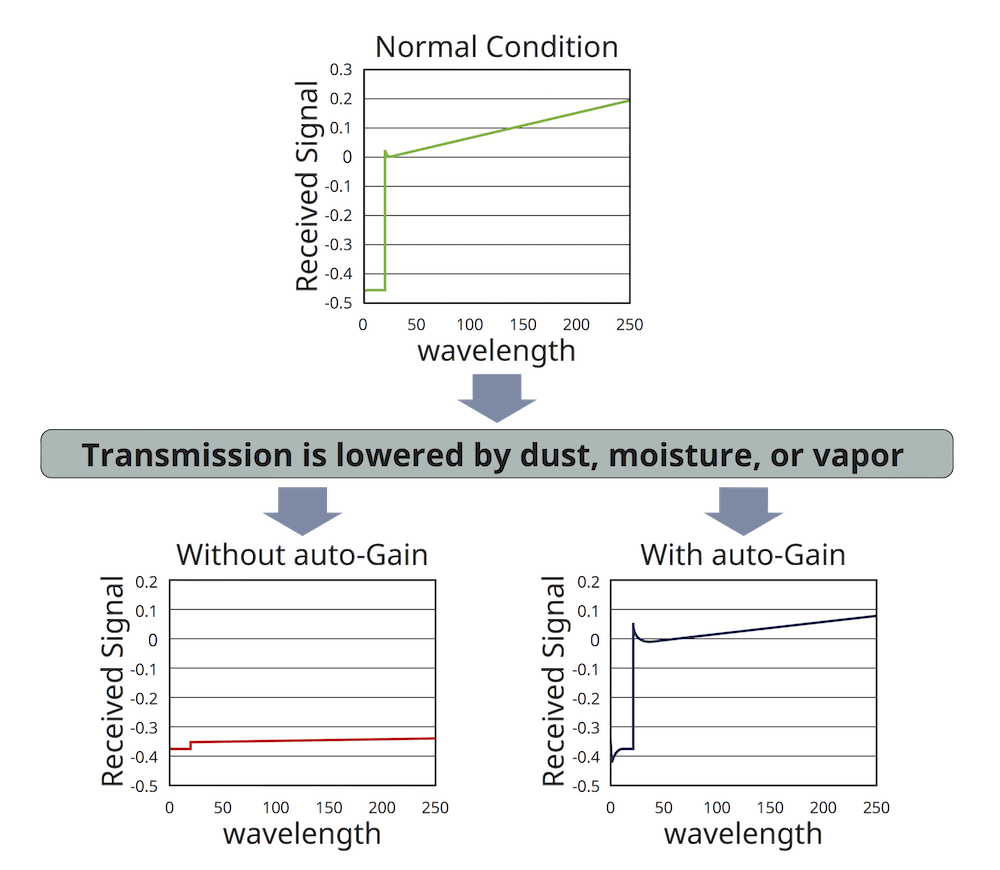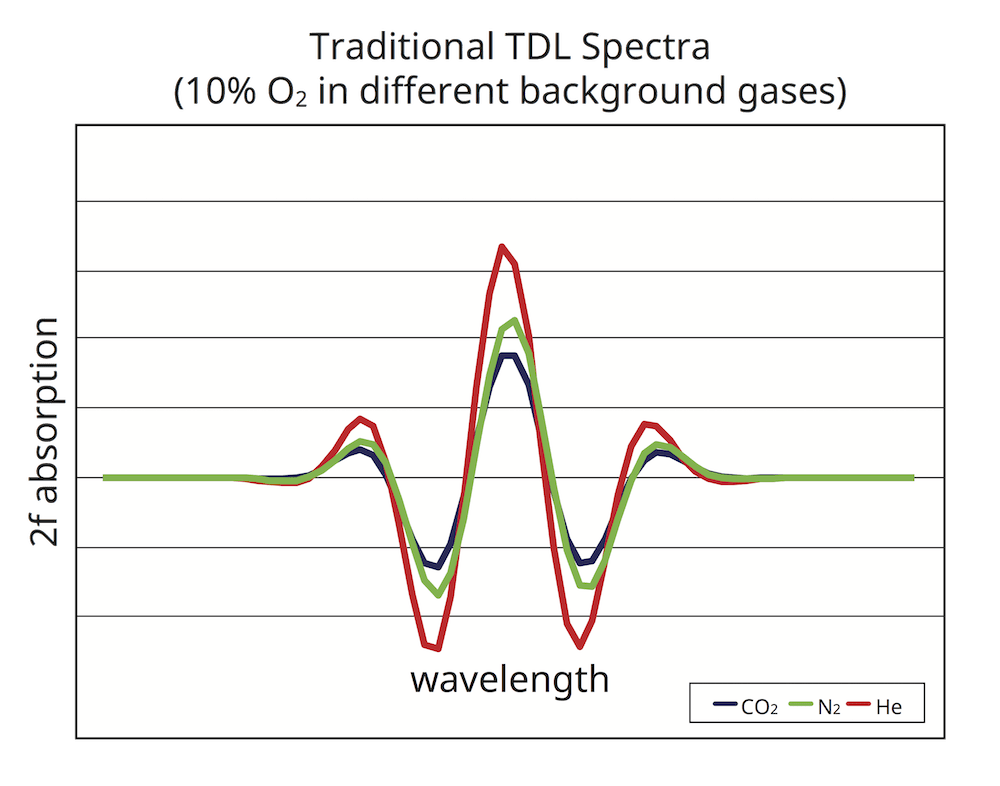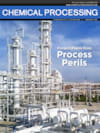Yokogawa’s new TDLS8000 houses all of the industry’s leading features in one robust device. The platform design is for in situ measurements that eliminate the need for sample extraction and conditioning. The non-contacting sensor allows for a variety of process types including corrosive, abrasive, and condensing.
The first generation platform has been proven in many others for the measurements of O2, CO, CH4, NH3, H2O and many more NIR absorbing gases. This second generation platform has improved reliability and ease of installation and maintenance while still meeting or exceeding designed application demands.
The most trusted laser analyzer designed specifically to meet all of your requirements in one robust device that is easy to operate and maintain.
Features
- SIL2 TruePeak combined with smart laser Technology
- Intuitive touchscreen HMI
- HART and Modbus TCP communications standard
- 8-stage auto-gain adapts to difficult applications
- Fully field repairable with 50 days of data and spectra storage
- Compact design for one-man installation without sacrificing ruggedness
- Area classification Zone2/Div2 or Zone1/Div1
System Configuration
Standard System Configuration
HART communication available

System Configuration with HMI

Multi Analyzer Configuration with Remote HMI
Up to 4 units connection available

High Reliability
 Reference Cell
Reference Cell
Internal reference cell in the laser module ensures peak locking during trace measurement.
Auto gain
Auto-gain enables wide signal ranges against dynamic variation of transmission.
Validation
Validation can be initiated manually, remotely, or automatically on a daily, weekly or monthly basis defined by the user.
SIL2 certified
IEC61508 SIL designed & approved, SIL2 capability for single analyzer use, SIL3 capability for dual analyzer use.
TruePeak
The TruePeak we can measure the area of the absorbance peak. This eliminates effects from changing background gases, allowing for simple pressure and temperature compensation.


Intuitive touchscreen HMI
Touch screen 7.5 inch color LCD on HMI
- Makes it simple to operate
- Gives all the information including trend graph and eliminate PC to maintenance
- Can be remotely installed


Mini Display
Optical transmission at both the ends for easy alignment

Details
Standard Specifications
| Measurement object | O2, CO, CO or CH4, CO2, CO + CO2, H2O, NH3, NH3 + H2O, H2S, HCl concentration in combustion exhaust gas and process gas | |||
|---|---|---|---|---|
| Measurement system | Tunable diode laser spectroscopy | |||
| Measured components and range | Measured component | Min. range | Max. range | |
| O2 | 0-1% | 0-25% | ||
| CO(ppm) | 0-200 ppm | 0-10,000 ppm | ||
| CO+CH4 | CO | 0-200 ppm | 0-10,000 ppm | |
| CH4 | 0-5 % | |||
| NH3 | 0-30 ppm | 0-50,000 ppm | ||
| H2O (ppm) in non HC | 0-30 ppm | 0-30,000 ppm | ||
| H2O (ppm) in HC | 0-30 ppm | 0-30,000 ppm | ||
| CO (%) | 0-20 % | 0-50 % | ||
| CO (%) + CO2 (%) | 0-30 % | 0-100 % | ||
| NH3 + H2O | NH3 | 0-30 ppm | 0-5,000 ppm | |
| H2O | 0-5 % | 0-50 % | ||
| H2S | 0-5 % | 0-100 % | ||
| CO2 (%) High Range | 0-1 % | 0-5 % | ||
| CO2 (%) Extend.Range | 0-30 % | 0-50 % | ||
| H2O (%) | 0-10 % | 0-100 % | ||
| HCl | 0-50 ppm | 0-5,000 ppm | ||
| Output path length | Optical distance between the laser unit and the sensor control unit Standard; 0.5 to 6 m, Max; 30 m | |||
| Output signal | 2 points, 4 to 20 mA DC Output types; Gas concentration, Transmission, Process gas temperature, Process gas pressure Output range; 3.0 to 21.6 mA DC |
|||
| Digital communication | HART, Ethernet | |||
| Contact outputs | 2 points, contact rating 24 V DC, 1 A DO; Function: Activate during Warning / Calibration / Validation / Warm up / Maintenance conditions Fault; Function: Activate during normal condition, not activate during fault condition or when the system power is off |
|||
| Valve control output | 2 points Function; Activate calibration or validation solenoid valves for zero, span or validation gas Output signal; 24 V DC, 500 mA Max. per terminal |
|||
| Alarm | Warning; Gas concentration low/high, Transmission low, Process pressure low/high, Process temperature low/high, Validation required, Validation failure, Zero/Span calibration error, Non process alarm, External alarm Fault; Laser module temperature low/high, Laser temperature low/high, Detector signal high, Peak center out of range, Reference peak height low, Absorption too high, Transmission lost, Reference transmission low, Reference peak height high, Laser unit failure, Laser module error, File access error, E2PROM access error. |
|||
| Contact inputs (Digital input) |
2 points Function; External alarm/Calibration start/Validation start/Stream switch Contact specification; Zero voltage contact input Input signal; Open signal; 100 kΩ or more, Close signal; 200 Ω or less |
|||
| Input signal (Analog input) |
2 points, 4 to 24 mA DC Input types; Process gas temperature, Process gas pressure |
|||
| Self-diagnostics | Laser Unit temperature, Sensor Control Unit temperature, Laser temperature, Detector signal level, Memory read/write function, Peak locking condition | |||
| Calibration | Calibration method; Zero/Span calibration Calibration mode; Manual, Auto, Local initiate (HMI) |
|||
| Validation | Validation method; Up to 2 points Validation mode; Manual, Auto, Local initiate (HMI) |
|||
| Power supply | 24 V DC ±10% | |||
| Warm-up time | 5 min. | |||
| Protection degree | IP66, NEMA Type 4X | |||
| Hazardous area classifications | Division 1, Zone 1; Explosion-proof/ Flame-proof type; FM, cFM, ATEX, IECEx (Pending) Division 2, Zone 2; Non-Incendive/Type n; FM, cFM, ATEX, IECEx |
|||
| Process gas condition | Process gas temperature; Maximum 1500℃ Process gas pressure; Max. 1 MPa, Min. 90 kPa Dust in process gas; 20 g/m3 or less |
|||
| Installation condition | Ambient operating temperature; -20 to 55℃ Storage temperature; -30 to 70℃ Humidity; 0 to 95%RH at 40℃ (Non-condensing) Mounting flange type; ASME B 16.5, DIN, JIS Gas connections; 1/4 NPT or Rc1/4 Purge gas; Recommended purge gasses O2 analyzer; N2 (99.99% or greater, application dependent) H2O ppm analyzer; N2 (99.99% or greater with < 20 ppm H2O for feed to the optional dryer package) CO, CO or CH4, CO2, CO+CO2, NH3, NH3+H2O, H2S, HCl; N2 (99.99% or greater, application dependent) or Instrument air CO, NH3 analyzer: N2 (99.99% or greater, application dependent) or Instrument air Purge gas flow rates; 5-20 L/min for optic 5-30 L/min for process window Purge gas connections; 1/4NPT (-G1, -C2, -D2, -C2, -D1, -C1), Rc1/4 (-G2, -S2, -E2, -J2, -E1, -J1) |
|||
Performance
| Measurement gas | Repeatability | Linearity | |
|---|---|---|---|
| O2 | ± 1% reading or ± 0.01% O2, whichever is greater | ± 1% F.S. | |
| CO (ppm) | ± 2% reading or ± 1 ppm CO, whichever is greater | ± 1% F.S. | |
| CO + CH4 | CO | ± 1% reading or ± 1 ppm CO, whichever is greater | ± 2% F.S. |
| CH4 | ± 4% reading or ± 0.02% CH4, whichever is greater | ± 4% F.S. | |
| NH3 | ± 2% reading or ± 1 ppm NH3, whichever is greater | ± 2% F.S. | |
| H2O (ppm) in non HC |
± 2% reading or ± 0.1 ppm H2O, whichever is greater | ± 1% F.S. | |
| H2O (ppm) in HC | ± 2% reading or ± 0.1 ppm H2O, whichever is greater | ± 1% F.S. | |
| CO (%) | ± 1% reading or ± 0.01% CO, whichever is greater | ± 1% F.S. | |
| CO (%) + CO2 (%) | CO | ± 1% reading or ± 0.1% CO, whichever is greater | ± 1% F.S. |
| CO2 | ± 1% reading or ± 0.1% CO2, whichever is greater | ± 1% F.S. | |
| NH3 + H2O | NH3 | ± 2% reading or ± 1 ppm NH3, whichever is greater | ± 2% F.S. |
| H2O | ± 4% reading or ± 0.05% H2O, whichever is greater | ± 2% F.S. | |
| H2S | ± 1% reading or ± 0.005% H2S, whichever is greater | ± 1% F.S. | |
| CO2 (%) High Range | ± 1% reading or ± 0.005% CO2, whichever is greater | ± 1% F.S. | |
| CO2 (%) Extend. Range | ± 1% reading or ± 0.02% CO2, whichever is greater | ± 1% F.S. | |
| H2O (%) | ± 1% reading or ± 0.004% H2O, whichever is greater | ± 1% F.S. | |
| HCL | ± 1% reading or ± 2.5 ppm H2O, whichever is greater | ± 2% F.S. | |
YH8000 HMI Unit
The YH8000 is a HMI designed specifically for the Tunable Diode Laser Gas Analyzer, the TDLS8000.
- Touchscreen 7.5 inch color LCD on HMI
- Makes it simple to operate
- Can be remotely installed
- Up to 4 units connection available
Specification
| Display | Touchscreen 7.5 inch TFT color LCD panel, 640 x 480 (VGA) |
|---|---|
| Communication | Ethernet; RJ-45 connector, Communication speed; 100 Mbps |
| Protection degree of enclosure |
IP65, NEMA Type 4X |
| Weight | 4 kg |
| Mounting | Analyzer mount (Front, left-side, right-side) with tilt function, Pipe mount or Panel mount |
| Cable Entries | 1/2NPT or M20 x 2 |
| Installation conditions |
Ambient operating temperature; -20 to 55℃ Storage temperature: -30 to 70℃ Humidity: 10 to 90%RH at 40℃ (Noncondensing) |
| Power Supply | 24 V DC ±10% |
| Hazardous area classifications |
Division 2, Zone2: Non-Incendive/Type n; FM, cFM, ATEX, IECEx |
The simple and robust TDLS8000 assures the reliable and less maintenance operation of the analysis.
Fired Heater Combustion Safety and Lifecycle Management
Yokogawa TDSL8000 and CO + CH4 measurements provide reliable information to achieve:
- Combustion efficiency improvement
- Safety improvement
- Longer lifetime of the coils and coil hangers
- Higher throughout of the process heating
Limited O2 Concentration
O2 Measurement for Safety and Process Monitoring & Control Yokogawa TDLS8000 02 analyzer achieves:
- No sampling system operation
- Fast response analysis
- No interference analysis
- Less maintenance operation
Resources
Fired heaters are used for various processes in oil refining and petrochemical plants.
An in-situ TDLS8000 installed on a process leg or bypass stream provides a reliable and high-speed measurement that is representative of the process composition.
In maintaining and managing industrial plants, monitoring waste water pH/ORP is both a legal obligation and an unavoidable necessity for protecting the environment. Monitoring without an attentive eye can lead to severe consequences.
Considering safety and environmental issues such as combustion efficiency and decreasing NOX and CO in exhaust gas, it has become important to control O2 concentration in garbage incineration processes.
Electrolysis plants create hydrogen and chlorine from a brine solution. Chlorine gas generated from the anolyte of the electrolysis tank generally contains between 0.5 to 2.0 vol% H2O. The sample is then cooled and filtered to remove brine, subsequently coming out as wet chlorine gas. The wet gas is sent to a drying tower where it is treated with sulfuric acid to get moisture down to the ppm level.
Industrial Combustion sources such as thermal cracking furnaces and, process heaters play a critical role in the process industry.
The ammonia (NH3) gas is injected to remove the NOx and thus reduce the NOx concentration in the stack flue gas. With conventional NH3 analyzers that perform measurements indirectly, NH3 concentrations are obtained through a sampling system. Therefore, there are problems with the maintenance and running costs of the sampling system, and time delays in measurement. The TDLS8000 Laser Analyzer is the solution to all these problems.
O2 measurement is used to safely recover flue gas containing a high concentration of CO from a converter furnace. With conventional paramagnetic oxygen analyzers, O2 concentrations are obtained through a sampling system to recovery flue gas. Therefore, there are problems with the maintenance and running costs of the sampling system, and time delays in measurement.
Spectrometric technology can assess many critical characteristics about products, but it has limits. It can be challenging to determine when the line has been crossed
With fired heaters, users hope to get greater efficiency and reduced emissions but often are disappointed. Given the number of fired heaters operating every day and their importance in the process industries, any improvements realized across the board will have huge impacts. More units can reach their potential with some simple changes in work practices and technology upgrades.
SABIC Turns to Yokogawa TDLS Analyzers to Enhance Safety Functions and Production
Protect Plants from Process Perils, Up Your Fired Heater Safety with TDLS Technology - Chemical Processing - eHandbook April 2022
Hydrocarbon Processing article discussing tunable diode laser (TDLS) gas analysis for combustion management in fired heaters | June 2015.
Downloads
Brochures
- Tunable Diode Laser Spectrometer (1.2 MB)
- Improved Combustion with TDLS - TDLS8000, TDLS8100, TDLS8200 Series (9.7 MB)
- Improved Combustion Efficiency and Safety with TDLS Measurements (526 KB)
- Electrolysis Solutions: Instrumentation Solutions for Electrolysis Plant Applications (841 KB)
- Mining Solutions (3.2 MB)
Instruction Manuals
General Specifications
Software
- HART DD file - Tunable Diode Laser Spectrometer TDLS8000 [DevRev1]
- HART DD file - Tunable Diode Laser Spectrometer TDLS8000 [DevRev2]
- Yokogawa DTM HART
- TDLS8X series FileConverter Software Download [Login Required]
- TDLS8X series HMI Software Download [Login Required]
- HART DD file - Tunable Diode Laser Spectrometer TDLS8000
Technical Information
Certificates
Engineering Tools
- TDLS8000 Tunable Diode Laser Spectrometer (467 KB)
- YH8000 HMI Interface Unit for TDLS8000 Series (929 KB)
- IF8000 Isolation Flange for TDLS8000 (151 KB)
- YC8000 Flow Cell for TDLS8000 (149 KB)
- K9772XA, K9772XB, K9772XC, K9772XD, K9772XE, K9772XF, K9772XG, K9772XH, K9772XJ, K9772XL, K9772XM Calibration Cell for TDLS8000 (133 KB)
Forms
- TDLS Application Datasheet (6.3 MB)
Videos
Yokogawa’s new TDLS8000 houses all of the industry’s leading features in one robust device. The platform design is for in situ measurements which negate the need for sample extraction and conditioning. The non-contacting sensor allows for a variety of process types including corrosive, abrasive and condensing. The first generation platform has been proven in many others for the measurements of O2, CO, CH4, NH3, H2O and many more NIR absorbing gases. This second generation platform has improved reliability and ease of installation and maintenance while still meeting or exceeding designed application demands.
This video will walk you through how to remove the Large Aperture Optics (LAO) assembly from the TDLS8000, disassemble, clean/replace the glass, reassemble, and reinstall.
Fired heaters are the largest energy consumer in the manufacturing sector and represent a tremendous opportunity for energy savings. However, energy efficiency is not the only concern for fired heaters. Compliance and safety are continuous challenges.
In this one-hour presentation, we will discuss:
- How to improve fired heater safety and efficiency by controlling combustion using Tunable Diode Laser Spectrometers (TDLS) technology
- The 4 top industry challenges related to fired heaters
- How to efficiently and safely manage combustion
- How TDLS technology can improve operational excellence in fired heaters
News
-
Press Release Nov 23, 2015 Yokogawa Corporation of America Releases TDLS8000 Tunable Diode Laser Spectrometer
Looking for more information on our people, technology and solutions?
Contact Us




















